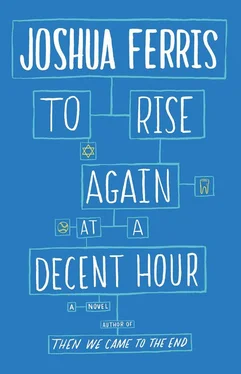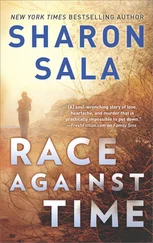“Are you making this up?” I asked.
“How could I make this up?”
“I don’t know,” I said. “Did it work?”
“For a while. But old habits die hard, you fall back into your familiar patterns, and then you fly out for a tune-up. They recommend once a year. Look it up on the Internet. People swear by it. They have a beautiful view of the ocean.”
He gestured again.
“What makes you do all this?” I asked.
“Ho,” he said. He gave me a sidewise glance. “You really want to know?”
“I really do,” I said.
He was waiting for the C train to pull into the station one day when suddenly he dropped to his knees. He was eighteen, broke, a freshman at Columbia studying economics. It was a day in late winter, and the trains were slow. The platform was crowded. Those nearest him parted as he went down, forming a small circle around him. What was indisputably a bowing down felt to Mercer like levitation. He was looking down on that little crowd looking down on him. Behind him, lifting him, making him light as a cloud, was the presence that touched him, which he knew he could not turn to look at. It was suffused light. He peered down with a smile on that little crowd wary of his contagion. They didn’t see the smile. They saw a kid fall first to his knees and then onto his back. Mercer, above them, where everything had fused into palpable spirit, knew everything about them: their agitations, their rancors, their grudges against the city, and his smile was merciful. He even knew their names and where they lived. He dwelled in eternity’s single instant, a dimensionless black dot on the one hand (that was the best part, he said, being nothing, being a black dot) and, on the other, centuries of void and fire, glacial eras, the enduring silence of undiscovered caves. In the common parlance, it was an epiphany, a revelation, a religious experience. Run of the mill, probably, by his own admission. The train approached. The people debated internally. Alert someone? Or ignore and board? A few of the more concerned moved him back, closer to safety. Who, or what, Mercer touched, and what touched him back through his own hovering figure, now broke away. He was no longer floating. He felt his back against the platform, the chill through the coat. Trains came and went. The start of God’s absence from his life began.
“When I was twenty-eight,” he said, “I did something I had resisted doing since that day on the platform. I took the train out to Brooklyn, to an address I had never been to. I didn’t expect to find the woman I was looking for, but there was her name on the buzzer. I said to her, ‘Do you remember me?’ and she nodded, but she couldn’t place me. It had been ten years, after all.”
“What had been ten years?”
“Since we had seen each other on the platform. She was among the crowd that day.”
“How did you know where she lived?”
“I told you,” he said. “I knew their names and addresses.”
He should have just left — apprehended her, confirmed her, and walked away. But she invited him inside, and he followed her up the stairs. They sat down with coffee, and she asked him if the man had ever been found.
“The man?” he said.
“The man who hit you,” she said.
He had torn through the platform half naked, hit Mercer with a brass kettle, and down he went. “Just minding your own business,” said the woman, “and he came running right at you.”
“That’s not how I remember it,” he said.
“How do you remember it?” she asked.
“I know your name, don’t I?” he said. “How do I know your name and address? Explain that.”
“I gave all my information to the police,” she said. “You must have gotten it from them.”
Twenty years later, when Grant Arthur explained the origin of the Ulms, Mercer was prepared to listen. God had never reappeared to them, either. Not to reprimand them. Not to instruct them. Not to comfort them. Not to reassure them. Not to redeem them.
“It has been over three thousand years, and God has not returned for them,” he said. “It has been over thirty for me. Who better to understand the virtues of doubt than someone who once stood in the direct presence of God and had that memory taken away?”
He looked off.
“I must sound insane to you.”
“Strange things happen,” I said.
He turned to me with heavy eyes. I was reminded that he had arrived before me and that I wasn’t likely to catch up now.
“But I was still skeptical. I even hired a private detective to look into Grant Arthur. Asian woman. Come to think of it, she might still be on the payroll.”
“How does anyone doubt God when He supposedly appeared?” I asked him.
“You haven’t read it?”
“Read what?”
“Cantonment 240.”
“No.”
“Read it,” he said. “Your questions go away.”
“What happens in cantonment 240?”
He drank his drink and called for another.
“I can’t do it justice,” he said.
“Give me the gist.”
“I’m sorry,” he said, “I can’t. And I wouldn’t try. I wouldn’t do that to you. It’s not an experience you want secondhand. You’ll have to go to Seir.”
He picked up his glass. He swung it like a cradle between his fingers, gently moving the liquid, peering into it, through it.
“I don’t want to have any more questions,” he said. “I have questioned myself out of too much. It’s only made me unhappy.” He turned to look at me, head a little loose on its stem. “Not a Christian, not a Buddhist. Zoroastrian no, atheist no. Not waiting for the mothership.” He downed the drink. “I’m a whore, Paul,” he said. “A whore who has bent her head into every car window that would lower itself. I’m tired of that. I want to be who I am.”
He gestured for the bartender.
“To be passed over by God in the final days, that must be a terror,” he said. “But to feel like you’ve been passed over by God all your days on earth? That, my friend, is hell.”
The weekend came, and I hung out with McGowan. We went to a bar and had a few beers. He caught me up with the Red Sox. I told him I couldn’t shake the image of Harper and Bryn going to the mall together, swinging the kids on swings, making them mac-and-cheese and giving them baths. He didn’t know who Harper and Bryn were. It was so easy to find yourself out of touch these days, I said to him.
“Who are they?” he asked.
“Strip away the celebrity, and they’re just normal people,” I said. “Why can’t I be more like normal people?”
“Because you’re not normal,” he said. “You’re totally fucked up.”
“Thanks,” I said.
“You are, Paul, you’re totally fucked up. You struggle with depression. Your idea of engaging with the world is watching a Red Sox game. And you take the job too personally.”
“I don’t take the job too personally. I take the job as it comes.”
“You think about the people,” he said. “You can’t do that. Their failings, their misfortunes. You have to think of it as one big disembodied mouth.”
“That’s what I try to do.”
“You try,” he said, “but you fail.”
I thought he was being a little hard on me. I just wanted to thank the guy for helping me out of the gym.
“You’re right,” I said. “I am fucked up.”
On Sunday I drove up to Poughkeepsie, to the Sarah Harvest Dodd Home for the Elderly, to see my mom. I’d like to say that we had a nice chat and a rewarding visit, but she hadn’t had anything resembling a functioning brain for five and a half years. She couldn’t piss, shit, or eat on her own. She hummed a lot and stared at the TV. She always looked the same: noticeably older. She sat in a wheelchair in a room with long floral curtains and a netless Ping-Pong table. I sat down next to her and started asking all the questions I always asked. “How are you feeling?” I said. No response. “Are you comfortable?” No response. “You want this pillow?” No response. “Have you missed me?” No response. “What did you have to eat today?” No response. “What are you watching?” No response. “Are they treating you well?” No response. “What can I do for you, Mom? Anything?” No response. I started telling her about myself. “I’m doing well,” I said to her. “The practice is going well. Everyone seems to be pretty happy. I do have some bad news, I guess. Connie and I broke up. We’ve been broken up for a while now, but this time it’s for good. She’s seeing someone new. I’m happy for her, as happy as I can be. Which is off the charts happy, Ma. Do you remember Connie? Of course you don’t,” I said. “You have no fucking clue who Connie is. She came up to visit you a few times. She liked you. She did, she combed your hair. She does shit like that. It breaks your fucking heart.” I took her hand. No response. “Mom,” I said. No response. Her head was cocked almost in the direction of the TV. “Remember when I couldn’t sleep?” No response. “Dad died and I couldn’t sleep?” No response. “And then one night, you happened to tell me about Chinese people?” No response. “I was so scared that I’d be the last person awake in the world. I don’t know why that was so scary to me, but it was. But you said I couldn’t be the last person awake in the world, because just as we were going to sleep, all the people in China were waking up. Do you remember telling me that?” No response. “That helped,” I told her. “Did I ever tell you that?” No response. “Even though Chinese people were strange to me then, you know, because of their eyes. I hope I told you that before you lost all your fucking marbles,” I said. No response. “I’m sorry I kept you up. You were trying to hold things together,” I said. “You did a good job. Did I tell you that, that you did a good job holding things together?” No response. “Did I ever thank you?” No response. “Can I thank you now?” No response. “Can I kiss you, Mom? Can I kiss you right here on your forehead?” No response. I kissed her. No response. “Even now,” I said, “when I can’t sleep, it helps me to think about the Chinese. All thanks to you. And then, when I do fall asleep, I sleep like a baby, Ma. Every night, I sleep like a dream.”
Читать дальше












